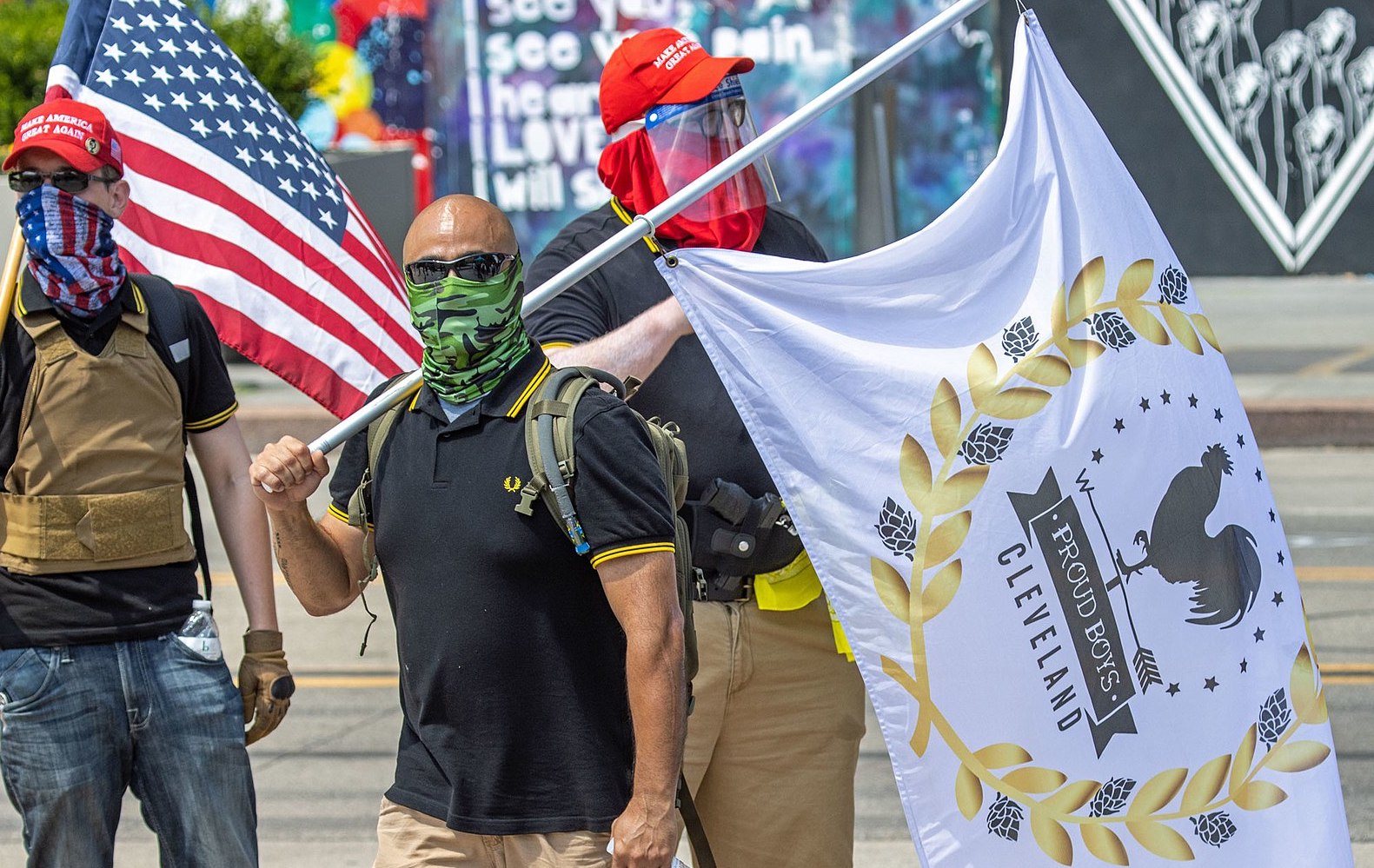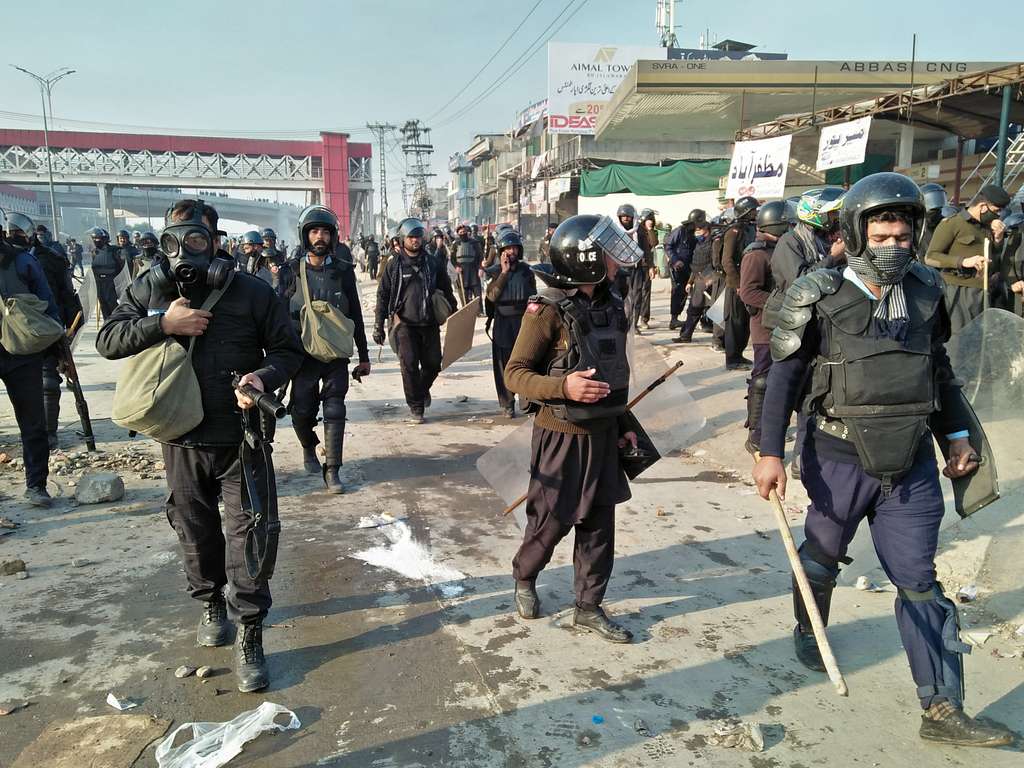The Complicated Consequences of Canada’s Proud Boys Terrorist Listing
Canada's decision to designate the Proud Boys a terrorist entity could ultimately align the organization with the civil society actors and racialized communities the group so violently decries.

Canadians watched in horror on Jan. 6 as the Capitol of our closest ally and security partner was overrun. The dismay felt by many Canadians came in part because of what the targeted institution represents, and in part, because we recognized the hatred and fervor in those who sought to tear it down. In recent years, like their counterparts to the south, Canadian security agencies have warned of the growing danger of ideologically motivated violent extremism (IMVE). Deadly attacks in Quebec and Toronto have underscored the threat.
As details of the events of the Jan. 6 emerged, including the widely reported role of the Proud Boys (an organization, many in Canada are quick to point out, founded by a Canadian) pressure mounted on this side of the border to “do something.” As parliamentarians returned to the House of Commons for the first time in 2021, they unanimously passed a motion calling on the government “to use all available tools to address the proliferation of white supremacist and hate groups, starting with immediately designating the Proud Boys as a terrorist entity.” The motion had no legal effect, but it was nevertheless disconcerting, because it called on the government to undertake a specific legal process with a predetermined legal outcome and potentially serious consequences, seemingly collapsing the arms-length separation typically maintained between politics and the criminal law.
Yet, nine days later, Minister of Public Safety Bill Blair did exactly what politicians called on him to do: He added the Proud Boys to Canada’s terrorist entity list, along with three other IMVE groups and ten affiliates of the Islamic State and al-Qaeda. In his public statements, Blair repeatedly reiterated that the decision to list the Proud Boys was based on intelligence and evidence, not political or public pressure.
What does the listing mean?
In Canadian criminal law, a terrorist group is either “a) an entity that has as one of its purposes or activities facilitating or carrying out any terrorist activity, or b) a listed entity, and includes an association of such entities.” “Entity” means “a person, group, trust, partnership or fund or an unincorporated association or organization,” while a “listed entity” means “an entity on a list established by the Governor in Council under section 83.05” of the Criminal Code. For the purpose of the list, it makes no difference whether the entity is foreign-based or entirely domestic.
Section 83.05 empowers the cabinet to list an entity by regulation if:
on the recommendation of the Minister of Public Safety and Emergency Preparedness, the Governor in Council is satisfied that there are reasonable grounds to believe that (a) the entity has knowingly carried out, attempted to carry out, participated in or facilitated a terrorist activity; or (b) the entity has knowingly acted on behalf of, at the direction of or in association with an entity referred to in paragraph (a).
The requisite threshold, “reasonable grounds to believe,” is a standard employed often in Canadian law: It requires an evidence-based belief that something is probable.
The consequences of listing are both direct and indirect. The most immediate impact is that under Section 83.08 of the Criminal Code, no person in Canada or Canadian outside Canada can knowingly deal with the property, provide financial services or facilitate any transaction owned or controlled by the group. For example, no financial institution can process payments by or to Proud Boys chapters, or offer known members a loan. Those who do control or manage property and transactions for the group must notify authorities. Moreover, financial institutions have a continuous obligation to identify and report any property or transactions owned or controlled by a listed entity to regulators.
While the listing does not criminalize membership in the Proud Boys, it is now an offense to provide funds or assistance to the group. Under the Criminal Code, it’s a crime to collect, provide, make available or invite a person to provide property or financial or other related services knowing that they will be used by or benefit a terrorist group. How that property is used is of no consequence. Meaning, buying a Proud Boys T-shirt from the group or paying membership dues is now a terrorism offense in Canada. It is also a crime to instruct a person to do something for a terrorist group; to enhance its ability to facilitate or carry out a terrorist activity; and an offense to commit an indictable offense under a federal law for this terrorist group. The Criminal Code further criminalizes “participation in, or contributing to, the activity of a terrorist group where the purpose of this participation is to enhance the latter’s ability to facilitate or carry out a terrorist activity.” Behavior viewed as participation and contribution includes: recruitment of trainees, crossing an international border, and providing or offering to provide a skill or an expertise for the benefit of, at the direction of or in association with a terrorist group.
Criticism of the Terrorist Entities List
Generally, criticisms of Canada’s terrorist entities list are drawn along two lines. The first is that the list is an ineffective counterterrorism tool and merely a means for the government to be seen to be “doing something” about a threat. The second is the civil liberties objection that the listing process is insufficiently transparent, unconstitutional and a tool used to condemn and marginalize certain segments of the population. As Craig Forcese and I outline in our recent book, there is some truth in each claim. I personally believe the Proud Boys listing has important implications for both.
Effectiveness
It’s empirically true that in almost every instance, adding an entity to the list has not resulted in a single criminal charge or prosecution. However, it is also true that the vast majority of the entities listed to date have had little to no footprint or support in Canada. This is not the case for the Proud Boys, which has chapters, members and supporters across Canada whose finances will be directly affected by the listing. Further still, although Canada’s terrorism offenses have always been extraterritorial in reach, Canadians looking to continue to support the group are much more likely to find themselves subject to criminal investigation by the RCMP.
Lawfulness
Civil rights activists and legal scholars have questioned the constitutionality of the listing process since its inception. The process lacks a number of procedural fairness elements typically considered necessary in Canada for a regime that so significantly impacts the liberty and security of persons. There is no requirement to give notice or any opportunity for reply before a listing is finalized. An appeal of the listing to the Federal Court will be heard ex parte and in camera, and may rely on information or evidence withheld from the organization. Moreover, the single appeal of a listing since 9/11 (by a small Canadian charitable organization) was stymied because the government refused to unfreeze its assets to allow the group to pay its related post-listing legal fees.
As noted above, because the Proud Boys are likely to be more directly affected by a listing, they are also far more incentivized to appeal their listing before the Federal Court than previously listed groups. With the heightened scrutiny this decision has received, the minister may also be more inclined to use his discretion to grant access to funds needed to bring that challenge and make it the first constitutional test of Canada’s listing process.
Remarkably, designating the Proud Boys a terrorist entity could ultimately align the organization with the civil society actors and racialized communities the group so violently decries.




